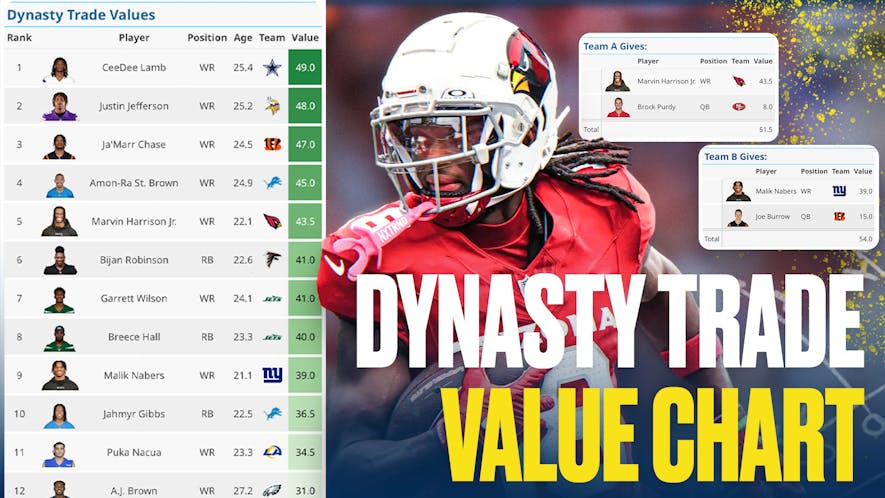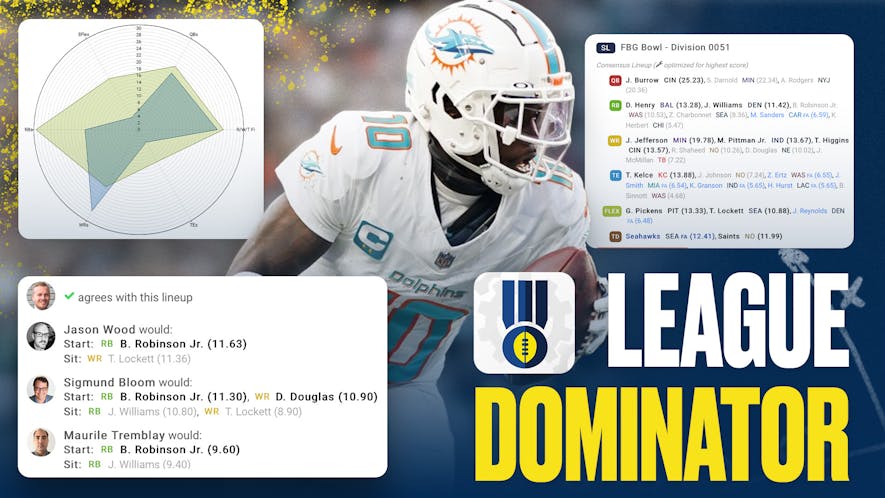
Some keeper leagues require players to be under contract in order to be kept from one season to the next. Once the contract runs out - often around three seasons - that player can no longer be kept and is placed back into the available player pool. How would such a rule change the way your look at age? Does age still matter in these formats, or do you ignore it?
Alex Miglio: For the most part, it shouldn't matter. It gives a bit less value to rookies, who for the most part will not be major fantasy factors in their first or second season. About the only thing to avoid is going to be commonplace in standard leagues—don't draft old fogeys. (No offense to old fogeys at Footballguys, of which I am rapidly becoming one.)
Chad Parsons: The dynamic reduces the benefit of extreme longevity in the marketplace, where a producer (or expected producer) early in their career arc gets a boost with such a long runway in front of them. However, like Alex mentioned, the difference is not substantial. I would be more comfortable with a blended roster of younger players and older production bets for the current season. Contracts, like straight salary cap formats, create more trading opportunities with the introduction of finances or a team cap among owners. I would shorten my player value formulas to temper down the age benefit towards their market value down to 3-4 seasons into the future, blending true dynasty and typical redraft valuations.
Clayton Gray: In a normal keeper league, I barely consider age. In a keeper league with short-term contracts, I wouldn't view age as a factor at all. It's hard enough to predict what will happen in 2016, and I'm definitely not going to be very accurate trying to forecast the 2018 season. If a guy can play this year, I'm taking him in a redraft or in a keeper.
Mark Wimer: Clayton nailed it - you can cut underperforming older guys a couple years down the line if necessary, and replace them with bench players to develop so that you keep a blend of youthful potential and veteran experience on your roster, as Chad P. discussed. In a salary-cap keeper league, there is sometimes a significant financial hit on your fantasy team cap if you cut someone early in his contract, but the remedy for this is to only sign players to short-term (one-to-two-year) contracts. As Clayton stated, it's hard enough to project players' production 16 games into the future, let alone 32 or 48. And given the NFL's tendency to hand out player suspensions - well, let's just say that even the most talented players in the (seemingly) most stable of situations are at risk for missing significant portions of future seasons - and then we have to fold in the non-trivial risk of catastrophic (Victor Cruz-type) injuries. Bottom line, don't bet much on three-to-four years down the line, if at all.
Andy Hicks: For dynasty or keeper leagues, if I don't think I can win in the current season I am not doing it right. Therefore age is irrelevant. Of course I would look at replacing older players with new through wheeling and dealing, the draft or free agents. I'd rather sell a player one year too early in this format, while they had value.
John Mamula: The rule change would affect how I target rookie players and older players. Unless the rookie is in a favorable situation for immediate production, such and Ezekiel Elliott or Tyler Boyd, I would avoid. There is too much risk with tying up one of your roster spots on a rookie that may not break out for a couple of seasons. Older RBs such as DeAngelo Williams have a limited window in this format due to the risk of him being out the league prior to his fantasy contract being up. We have seen older QBs, such as Peyton Manning, fall off drastically toward the end of their career. Sure you can drop the player after their production falls off, but it is often a fine line of either dropping too soon or waiting too long. I would prefer targeting players in the prime of their careers in this format.
Jason Wood: While I'm personally against the arbitrary limitation of having limits on how long you can keep someone, I would agree with most of my colleagues that it really doesn't make much of a difference in draft strategy outside of perhaps quarterback. Very few fantasy assets hold their value beyond three years anyway. In essence, this rule may ultimately lead to better decision making as it forces people to forego a player they might otherwise have been tempted to keep. Net-net, I would say the effect evens out though in well managed leagues.
Will Grant: Agree with the "age isn't a factor" crowd in a keeper league. To me, keeper means there is a limit to the number of people that you carry over from one year to the next, vs. dynasty where you carry forward all or almost all of your roster. So a keeper contract wouldn't bother me very much because you're naturally going to draft a mix of younger and older players, looking to put up the best numbers. You usually land a young player with upside early anyway because the veteran players in their prime are usually on a roster. Draft guy who will help you win now. Think about next year a little, and look to free agency as the season wears on to grab a player who might be a good keeper candidate for next year if you need one.


